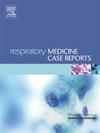无法分类的间质性肺炎和切除肺鳞状细胞癌患者术后给予纳沃单抗后致死性免疫检查点抑制剂相关性肺炎:1例报告
IF 0.7
Q4 RESPIRATORY SYSTEM
引用次数: 0
摘要
免疫检查点抑制剂相关肺炎(ICI-P)是一种已知但潜在致命的潜在间质性肺疾病(ILD)患者并发症。然而,关于术后ci - p的报道仍然很少。病例介绍:我们报告一位67岁男性,患有无法分类的间质性肺炎,因IB期鳞状细胞癌行右上肺叶切除术。给予两个周期的辅助纳武单抗。第2周期后10天,患者出现发热和进行性呼吸困难。胸部CT示双肺弥漫性磨玻璃影及实变。尽管最初使用高剂量皮质类固醇有所改善,但呼吸衰竭复发且进展迅速。患者发病21天后死亡。切除肺的病理检查证实纤维化与无法分类的间质性肺炎和鳞状细胞癌相容。没有进行尸检。结论:该病例强调了先前存在ILD的患者术后使用纳武单抗治疗的潜在致命风险,即使是在无法分类的间质性肺炎的情况下。在这一人群中考虑辅助免疫检查点抑制剂时,需要仔细的风险-收益评估。本文章由计算机程序翻译,如有差异,请以英文原文为准。
Fatal immune checkpoint inhibitor-related pneumonitis following postoperative nivolumab administration in a patient with unclassifiable interstitial pneumonia and resected lung squamous cell carcinoma: A case report
Background
Immune checkpoint inhibitor-related pneumonitis (ICI-P) is a known but potentially fatal complication in patients with underlying interstitial lung disease (ILD). However, reports of ICI-P in the postoperative setting remain scarce.
Case presentation
We present a 67-year-old man with unclassifiable interstitial pneumonia who underwent right upper lobectomy for stage IB squamous cell carcinoma. Two cycles of adjuvant nivolumab were administered. Ten days after the second cycle, the patient developed fever and progressive dyspnea. Chest CT revealed diffuse ground-glass opacities and consolidation in both lungs. Despite initial improvement with high-dose corticosteroids, respiratory failure recurred and progressed rapidly. The patient died 21 days after onset. Pathological review of the resected lung confirmed fibrosis compatible with unclassifiable interstitial pneumonia and squamous cell carcinoma. No autopsy was performed.
Conclusion
This case highlights the potentially fatal risk of postoperative nivolumab therapy in patients with pre-existing ILD, even in the setting of unclassifiable interstitial pneumonia. Careful risk–benefit assessment is warranted when considering adjuvant immune checkpoint inhibitors in this population.
求助全文
通过发布文献求助,成功后即可免费获取论文全文。
去求助
来源期刊

Respiratory Medicine Case Reports
RESPIRATORY SYSTEM-
CiteScore
2.10
自引率
0.00%
发文量
213
审稿时长
87 days
 求助内容:
求助内容: 应助结果提醒方式:
应助结果提醒方式:


